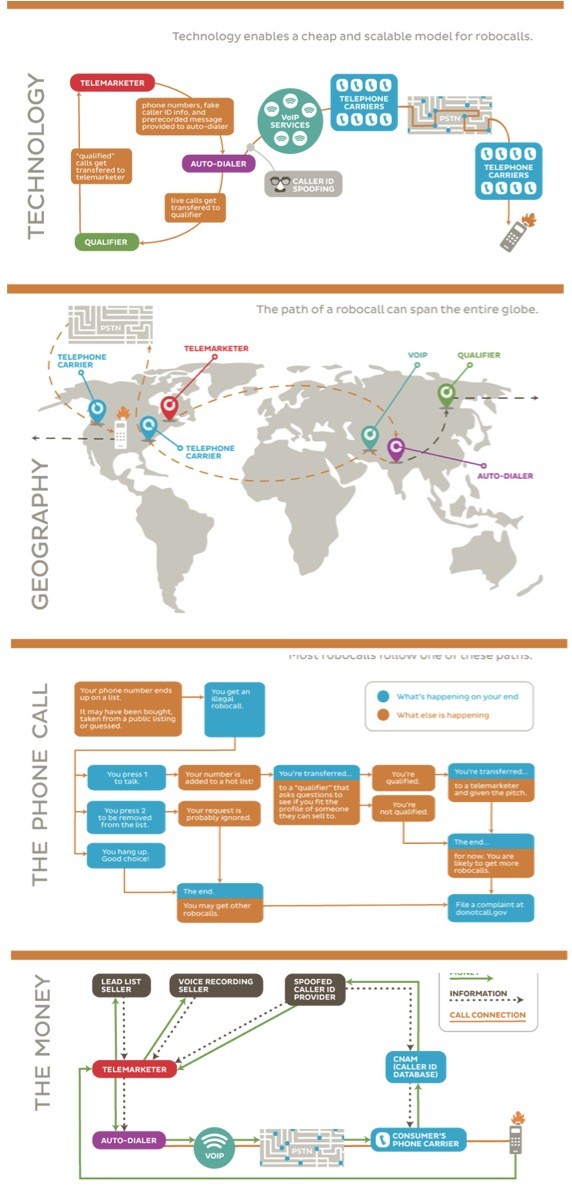Robocalls: Annoying and Illegal
Avoid This Customer-Unfriendly Practice Except for Appointment Reminders
So, how annoying are those automated marketing calls that interrupt you at dinner time? And they aren’t only annoying, they’re illegal in the U.S. Still, robocalling, as it is called, is proliferating. The FTC Robocalling Challenge solicited technology solutions to stop those calls before your phone rings. One of the solutions, Nomorobo, is now being offered to consumers for free, although your carriers might not yet support it. Read about robocalling, the winning Challenge solutions, and what you should do when you are robocalled.
NETTING IT OUT
Like most American consumers, I am plagued by automated telemarketing phone calls—a.k.a. robocalls. And, like pretty much everyone else, they annoy the heck out of me. And, by the way, the practice is illegal in most cases. So why, in a customer-centric economy, does robocalling continue to proliferate?
Robocalling is a very cheap way to contact a lot of people! And, because it is very hard to identify the companies initiating the robocalls, it is hard to stop them.
Last year, the Federal Trade Commission (FTC) issued a challenge for technology solutions that could stop this customer-unfriendly practice. Among the winners is an offering called Nomorobo that is now available to consumers for free (as long as their carriers support the technology). Currently, only a few carriers have signed on, but we’re hopeful that others will jump aboard and help rid our phone lines of these unsolicited, illegal, and downright irritating and interruptive calls.
MARKETING ROBOCALLS: ANNOYING AND ILLEGAL!
Bad Customer Experience!
You get home from work just after 5, you’ve just turned on the TV news, or you’ve just started preparing dinner, and the phone rings. You rush to pick it up, and a recorded voice says, “This is Card Services, and this is your final notice. There is nothing wrong with your credit cards. But you can get an improved interest rate and lower your debt…” etc., etc.
Liar! It isn’t the final notice. Every few days, the same call will come at about the same time.
The automated voice continues, “Press 1 to speak to a representative; press 2 to be permanently removed from this list.”
Liar! We’ve all pressed 2 many times, yet that recorded voice still haunts us almost nightly.
So you press 1 to tell the representative that you aren’t interested. But when you get the human at the other end, as soon as you say, “please remove me…,” he hangs up. He doesn’t want to hear it and doesn’t do anything about it.
You’ve been robocalled!
As I conducted research for this article, I found a great quote by Jeff Gelles in an article on Philly.com, who, after describing the almost identical robocall as experienced by a friend, stated:
“The FTC says it receives about 200,000 robocall complaints a month - more than on any other topic. My nonscientific conclusion? If nearly 2.5 million complaints a year make their way to this small federal agency, robocalls are probably annoying, um, everyone in America who answers a phone.”
~ Jeff Gelles
He got that right!
What Is Robocalling
Very simply, robocalls are automated phone calls that play pre-recorded messages. Robocalling is used for political “get out the vote” types of calling as well as telemarketing. Robocalls may be strictly messages with no action expected on your part (“Polls open today at 8 am and will remain open until 8 pm); they may include interactive surveys (“Are you going to vote today? Press 1 for yes, 2 for no, 3 for undecided”), or they may be the screening portion of a live sales interaction (“To lower your interest rate, dial 1; to be permanently removed, dial 2” [Yeah, right!]). Actually, if you dial 2 or any other number to be removed, all that does is confirm that there is a person at that phone number who answers the phone and takes action (rather than just an answering machine), so your phone number now goes to the top of the list instead of being removed.
How Does a Robocall Work?
© 2013 Federal Trade Commission
1. The FTC provides this infographic to help explain how robocalling works.
Are Robocalls Legal in the U.S.?
Well, yes, but, mostly, no. CNN.com explains briefly, “Robocalls from political campaigns or get-out-the-vote efforts are allowed (and legal) under the FTC's Telemarketing Sales Rule, as well as under most state robocall laws (except when made to cell phone numbers and a few other exceptions). Unsolicited commercial telemarketing calls are illegal, and rampant, in the U.S.” And what used to be confined to landline abuse has spread to mobile devices…(more)
(Download the PDF to read the entire article.)
Sign in to download the full article
0 comments
Be the first one to comment.




